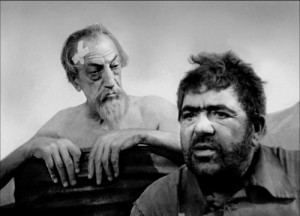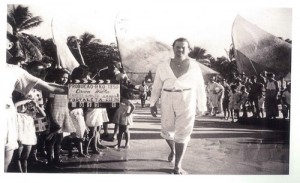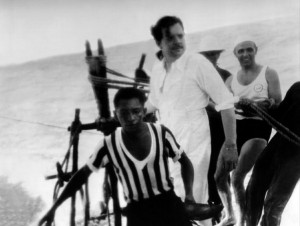Written originally for Trafic no. 12 (Fall 1994), where it appeared in French translation, translated by Bernard Eisenschitz; all three letters first appeared in English in Persistence of Vision No,. 11, 1995. — J.R.


June 13, 1994
Dear Bill,
It’s good to have all your multifaceted thoughts about It’s All True, which makes your letter worth the long wait. I especially value what you have to say regarding the political implications of the film in the 1940s as well as the 1990s, because it seems that those implications have mainly eluded critics in both decades. As you well know, it wasn’t until Robert Stam published “Orson Welles, Brazil, and the Power of Blackness” in the seventh issue of Persistence of Vision (1989), with corroborating essays by both Catherine and Susan Ryan, that it finally became clear, forty-odd years after the event, that part of what was rattling so many studio executives and Brazilian government officials alike about Welles’s behavior in Rio was his particular interest in blacks. Maybe you’re right that he wasn’t a radical, but if It’s All True had been completed and released in the early 1940s, it still might have offered a radical precedent: three Latin American stories focusing on non-white heroes. Read more
Written originally for Trafic no. 12 (Fall 1994), where it appeared in French translation, translated by Bernard Eisenschitz; all three letters first appeared in English in Persistence of Vision No,. 11, 1995. — J.R.


June 7, 1994
Dear Jonathan,
Sorry to have been so long replying. As you say, much has happened since you wrote your letter. We both started out years ago in a series of polemical articles to correct received ideas of Welles, and we seem to be making progress. This Is Orson Welles and It’s All True will be more widely read and seen than those articles ever were. Already Richard Combs, writing about f for fake in the January–February 1994 Film Comment, acknowledges the thesis of Welles the independent filmmaker advanced by you in “The Invisible Orson Welles” as a corrective to the idea of Welles the great failure, then proceeds to propose a new theory of the work, with failure of another kind inscribed in it from the start. That article would have been unthinkable a few years ago, when what might be called the vulgar theory of failure was still dominant.
The work on the Welles legacy is going well: Oja is set to co-direct a documentary that will include several of the important fragments; The Deep and The Other Side of the Wind may be finished in the next couple of years, and hope springs eternal where The Merchant of Venice is concerned. Read more
Written originally for Trafic no. 12 (Fall 1994), where it appeared in French translation, translated by Bernard Eisenschitz; all three letters first appeared in English in Persistence of Vision No,. 11, 1995. The version here, including my introduction, comes from Discovering Orson Welles. — J.R.

This chapter -— the longest in my 2007 book Discovering Orson Welles, and in some ways my favorite -— was originally written for the French quarterly Trafic, and in fact was the first thing I ever wrote specifically for that magazine. The late Serge Daney (1942–1994) —- whom I’d known since his stint as editor of Cahiers du cinéma, when he’d gotten me to serve briefly as its New York correspondent (after Bill Krohn had shifted from that post to the same magazine’s Los Angeles correspondent) -— died of AIDS not longer after launching Trafic, and by my own choice, my first contribution, a memoir about working for Jacques Tati (see “The Death of Hulot” in my collection Placing Movies), was something I’d already written for and published in Sight and Sound. My second contribution was my brief introduction to Orson Welles’s “Memo to Universal”, an “outtake” from This Is Orson Welles that had been accepted by Serge’s coeditors (Raymond Bellour, Jean-Claude Biette, Sylvie Pierre, and Patrice Rollet) during Serge’s illness. Read more





